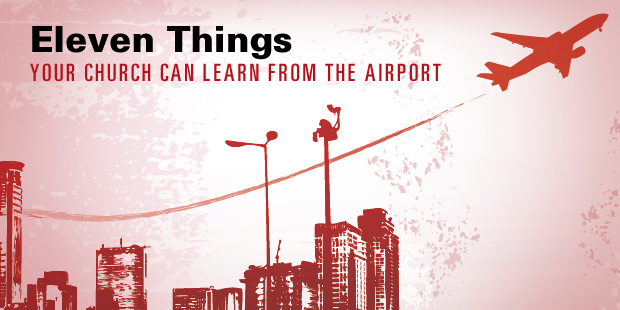
Eleven Things Your Church Can Learn from the Airport
by: Seth Godin
[Of course, this post isn’t actually about airports].
I realized that I don’t dislike flying–I dislike airports. There are so many things we can learn from what they do wrong:
- No one is in charge. The airport doesn’t appear to have a CEO, and if it does, you never see her, hear about her or interact with her in any way. When the person at the top doesn’t care, it filters down.
- Problems persist because organizations defend their turf instead of embrace the problem. The TSA blames the facilities people, who blame someone else, and around and around. Only when the user’s problem is the driver of behavior (as opposed to maintaining power or the status quo) things change.
- The food is aimed squarely at the (disappearing) middle of the market. People who like steamed meat and bags of chips never have a problem finding something to eat at an airport. Apparently, profit-maximizing vendors haven’t realized that we’re all a lot weirder than we used to be.
- Like colleges, airports see customers as powerless transients. Hey, you’re going to be gone tomorrow, but they’ll still be here.
- By removing slack, airlines create failure. In order to increase profit, airlines work hard to get the maximum number of flights out of each plane, each day. As a result, there are no spares, no downtime and no resilience. By assuming that their customer base prefers to save money, not anxiety, they create an anxiety-filled system.
- The TSA is ruled by superstition, not fact. They act without data and put on a quite serious but ultimately useless bit of theater. Ten years later, the theater is now becoming an entrenched status quo, one that gets ever worse.
- The ad hoc is forbidden. Imagine an airplane employee bringing in an extension cord and a power strip to deal with the daily occurrence of travelers hunched in the corner around a single outlet. Impossible. There is a bias toward permanent and improved, not quick and effective.
- Everyone is treated the same. Effective organizations treat different people differently. While there’s some window dressing at the edges (I’m thinking of slightly faster first class lines and slightly more convenient motorized cars for seniors), in general, airports insist that the one size they’ve chosen to offer fit all.
- There are plenty of potential bad surprises, but no good ones. You can have a flight be cancelled, be strip searched or even go to the wrong airport. But all possibility for delight has been removed. It wouldn’t take much to completely transform the experience from a chore to a delight.
- They are sterile. Everyone who passes through leaves no trace, every morning starts anew. There are no connections between people, either fellow passengers or the staff. No one says, “welcome back,” and that’s honest, because no one feels particularly welcome.
- No one is having any fun. Most people who work at airports have precisely the same demeanor as people who work at a cemetery. The system has become so industrialized that personal expression is apparently forbidden.
As we see at many organizations that end up like this, the airport mistakes its market domination for a you-have-no-choice monopoly (we do have a choice, we stay home). And in pursuit of reliable, predictable outcomes, these organizations dehumanize everything, pretending it will increase profits, when it actually does exactly the opposite.
Read more from Seth here.

Tags: Recasting Vision, Seth Godin, Vision Frame











